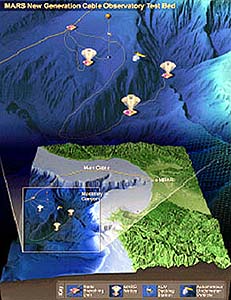 |
||||
Program NewsBiological Oceanography
/ Chemical Oceanography / Physical
Ocean TechnologyThe Ocean Technology Program accepts proposals for new instrumentation development that has broad applicability to ocean science research. Ocean technology proposals should enhance the observational, experimental, and/or analytical capabilities of the ocean science research community. Current priority areas include the development of sensors and sampling strategies to optimize investigations at ocean observing systems, instruments facilitating time-series observations, and the development of biological and chemical sensors. When submitting proposals, investigators are encouraged to provide a description of their plans to facilitate and encourage broader community use of the proposed instrumentation once it is developed. This can be included as supplemental documentation in FastLane. The Ocean Technology Program is responsible for continued planning for the Ocean Observatories Initiative. As part of this planning, OCE has sponsored the Committee on Scientific Cabled Observatories for Time Series (SCOTS) that will provide advice on the scientific problems that require, or would most effectively be addressed by, the use of electro-fiberoptic cables in the ocean environment. This committee will also identify the strategies needed to carry out the science identified. The strategies considered will include criteria for locating a cabled observatory and other design considerations (such as sensor requirements, data transfer, power needs, etc.). The SCOTS committee recently held a workshop in Portsmouth, VA (August 27-28) to gather community input relevant to their charge. This workshop gathered over 50 participants from all disciplines of ocean science and technology. Using recent planning documents, this group helped define cross-cutting scientific themes that would facilitate using the high power and bandwidth provided by seafloor cables and identified the infrastructure that must be put in place to enable this science. The SCOTS committee has posted its draft report for public comment on the CORE webpage http://www.coreocean.org/DEOS/ where additional information on this activity can be found. In addition to the SCOTS committee, OCE has also sponsored a study by the National Research Council that will develop an implementation plan for a network of seafloor-based observatories that would include both cabled seafloor nodes and moored buoys to support multidisciplinary research. These observatories would be located in both coastal and open-ocean areas. Specifically, the committee will: use existing reports and their own expertise to describe the scientific problems that will be addressed by a network of seafloor-based observatories (both cabled and moored buoy systems), describe the strategies needed to carry out the science identified, and use the plan developed to describe the significance and relationship of NSF’s research-based observatory network with the national Integrated Ocean Observing System being developed by Ocean.US. The committee roster for this study can be found on the NAS webpage http://www4.nationalacademies.org/dels/osb.nsf/web/activities?OpenDocument.
Coastal Ocean Processes Program (CoOP)There has been a lot of recent activity in the CoOP program. Proposals related to the Announcement of Opportunity (AO) for research on buoyancy-driven transport processes have been submitted and are out for review. This AO was developed from an open community workshop that defined the research needed to better understand processes controlling buoyancy-driven systems influenced by freshwater flows. The workshop results and Science Plan were published as the CoOP Report Coastal Ocean Processes: Transport and Transformation Processes over Continental Shelves with Substantial Freshwater Inflows (CoOP Report No. 7). This AO is driven by the importance of buoyancy-driven transport in controlling the cross-shelf transfer, transformation, and fate of biological, geological and chemical materials on continental margins. Proponents were asked to select study locations that have buoyancy-influenced flow as a major component of coastal transport with flow-induced dissolved and particulate constituent loads large enough to allow detection and quantification. Furthermore, the buoyant input should be sufficiently large to influence the structure and/or productivity of biological communities that are affected by freshwater inflow. The awards related to this announcement are expected to be announced by mid-December. In addition, CoOP held a workshop May 7-9 in Savannah, GA, entitled “Coastal Ocean Processes and Observatories: Advancing Coastal Research”. This workshop had more than 70 attendees representing at least 35 institutions from the United States, Great Britain and Canada. One goal of the workshop was to articulate the role coastal observing systems have in the study of coastal processes. Working groups first outlined coastal ocean processes that can best be investigated with coastal observatories. Discussions then focused on those processes that could be studied by a single observatory, by linking observatory networks and by combining observatory-based observations and products with traditional sampling techniques. The second goal of the workshop was to identify which existing observatory capabilities are most appropriate for addressing critical research questions and to prioritize observatory development areas which would provide the greatest benefit to future coastal oceanographic research. The report from this workshop, as well as the workshop agenda and list of attendees, is now available on the CoOP website at http://www.skio.peachnet.edu/coop/. I am also happy to announce that Rick and Debbie Jahnke have agreed to continue their excellent management of the CoOP office for another term. They have done a great job organizing and managing the many CoOP activities of the past year and we greatly appreciate their efforts.
Next Section --> |
||||
